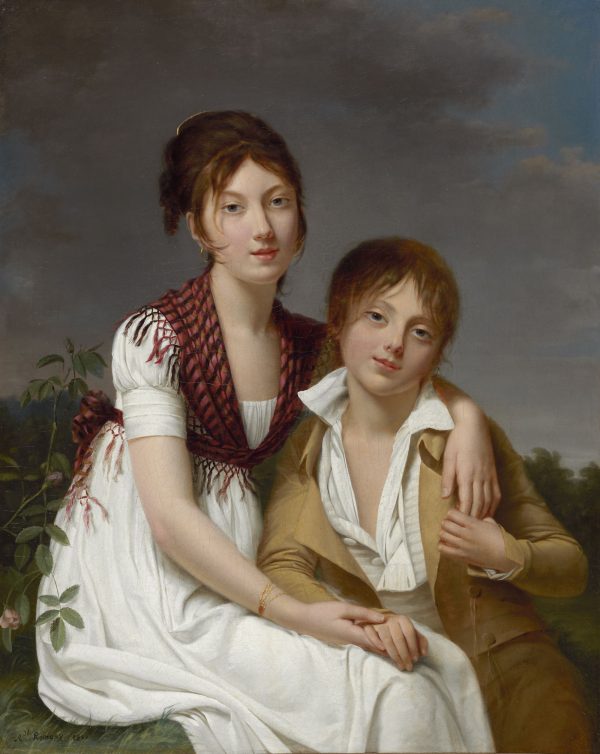Portrait of Amélie-Justine and Charles-Édouard Pontois, 1800
Oil on canvas, H. 0.92 m; W. 0.73 m
Signed and dated lower left: Adl. Romany 1800.
Provenance: Collection of the artist.
With her descendants until 2008.
Exhibited: Paris, Salon of 1800, n° 325, Portrait d’une jeune personne et de son frère (Portrait of a young person with her brother).
T. Ch., Le nouveau Arlequin et son ami Gilles au Museum ou la vérité dite en plaisantant. Critique piquante, en vaudevilles, des tableaux, dessins, sculptures et autres objets précieux, Paris, 1800, n° 325.
Adèle Romany’s name was initially Jeanne-Marie Mercier. She was an illegitimate daughter of the Marquis de Romance, Captain of the Guard, and of Jeanne-Marie Mercier, a married lady. She was legitimised at the age of nine and took over her father’s name “de Romance”. When she was grown up, she changed her first name from Jeanne-Marie to Adèle. In 1790 she got married to a painter of miniatures called François-Antoine Romany with whom she had one daughter, Aglaé-Aimée. After their divorce in 1793 she had two illegitimate children from two different men: Louise-Lucie Cosnefroy de Saint-Ange and Edmond-Jules Feline.
Romany was trained in a studio for woman artists directed by the painter Jean-Baptiste Regnault’s wife. She painted some genre scenes and also treated mythological and allegorical subject matters, but from the very beginning she was most interested by portrait painting. She participated in the Salon between 1793 and 1833 and showed more than 80 works there. At the Salon of 1808 her prolific talent was acknowledged by Napoleon, who rewarded her with a golden medal. Romany’s portraits had indeed a great success in Paris. She was commissioned a series of actors’ portraits to decorate the Comédie Française theatre, showing them in the costume of their favourite role.
The present painting belongs to an unpublished and specially interesting group of paintings. It shows another aspect of her work and allows us to learn more about her family life. Adèle Romany depicts the two children of her cousin Charlotte-Marie Mercier: Amélie-Justine and Charles-Edouard Pontois. Amélie-Justine Pontois (1788-1867) married Louis-Marie-Amable Laidin de la Bouterie in 1818. Her little brother Charles-Edouard Pontois (1792-1871) led a prestigious career. He was appointed French ambassador in Brazil, in the United States and in Constantinople and was decorated with the Grand Officer of the “Légion d’Honneur” and given the honorific position of Peer of France. In 1839 he was ennobled by Louis-Philippe and became count of Pontois.
An engraving by Monsaldy and Devisme showing the walls of the Salon of 1800 allows us to identify this double-portrait with the picture presented by Romany as “Portrait of a young person with her brother” (no. 325). This Salon was the first great success of the young painter. A poem published in Le nouveau Arlequin et son ami Gilles au Museum ou la vérité dite en plaisantant testifies that he present picture was surrounded by public enthusiasm:
“Air: This is true friendship. How nice this brother is!
Le nouveau Arlequin et son ami Gilles au Museum ou la vérité dite en plaisantant
Arlequin: And how nice his sister is!
Gilles: I really like this brother,
Arlequin: Me, I prefer his sister.
Gilles: I would like this brother to become my sister’s boyfriend.
Arlequin: I would like my brother’s sister to become her sister-in-law.
Gilles: I think we make them laugh. Let’s stay a bit longer, they will certainly start to talk with us.
Arlequin: Good bye, charming child, I regret to leave you (…).”
The present picture with its precise and delicate brushwork is typical of Romany’s early style when she was influenced by Jean-Baptiste Regnault. It shows her skilful use of colour and her virtuosity in depicting fabrics and details of costume. The bucolic surroundings, the youthfulness of the sitters, their half-length pose and their gestures of brotherly tenderness create an intimate atmosphere, coming straightway from the century of Jean-Jacques Rousseau. Further more, this portrait renders clearly Romany’s affection for her cousin’s children.
Our painting will be included in Jean-François Heim’s forthcoming book on Salon paintings during the French Consulate and Empire (1800-1814).
